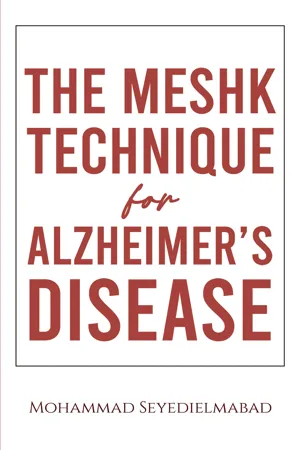
The Meshk Technique for Alzheimer's Disease
Mohammad Seyedielmabad
- 130 pagine
- English
- ePUB (disponibile sull'app)
- Disponibile su iOS e Android
The Meshk Technique for Alzheimer's Disease
Mohammad Seyedielmabad
Informazioni sul libro
This book is the output of a fundamental study that investigates human memory from a comprehensive perspective. The author's interest in discovering the structure and function of complex systems and providing simple and inexpensive solutions to the challenges facing humans led him to focus his research on human memory. As a result, his research has created a new insight into the structure and function of memory in humans called Meshk theory.
The word Meshk in Kurdish means brain. Kurdish is the only living language in the world that has extensively preserved its ancient Sumerian roots over thousands of years. The book breaks down the complicated scientific and biological concepts associated with human memory into a more understandable way. It also describes in detail the theory of Meshk and the technique developed based on its concepts for the prevention and treatment of Alzheimer's disease. The structure discovered for human memory in the theory called Human Memory Strand (HMS), as a super-DNA structure with extraordinary regenerative ability, is a turning point in the prevention and treatment of neurodegenerative diseases, especially Alzheimer's.
In this way, based on HMS, a simple, cost-free, and practical method called Meshk technique has been developed to restore memory information. The technique can be used effectively for all people to prevent Alzheimer's disease as well as to retrieve memory for people at any stage of the disease. The Meshk theory has been nominated for several international awards, including the Think Tank Awards 2021 and the AAIC 2022 Blas Frangione Early Career Achievement Award.